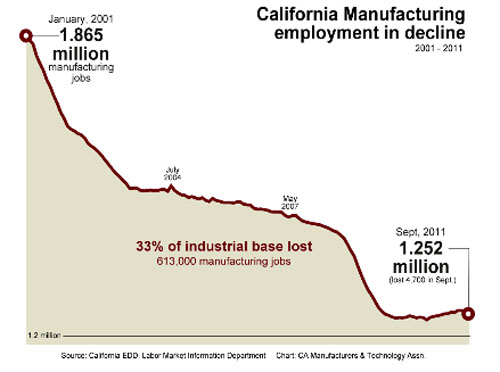“Designed By Apple in California,”
meet “Made By Motorola in Texas.”
(Editor - An interesting article about why businesses move jobs out of the People's Republic of California or never even consider California in the first place when opening a new business. What the big government Democrat Socialists do not understand is a business can set up anywhere on earth. California does not have to race to the bottom for the lowest tax rate, but we can streamline government to make us far more business friendly.)
“Designed By Apple in California,” meet “Made By Motorola in Texas.” Motorola Mobility, which is these days a division of Google, has begun turning out its new Moto X smartphone in its Fort Worth, Texas, factory. It is the only smartphone manufactured in the United States.
“Made in the USA” is a great marketing label, but it is almost meaningless. Like any other sophisticated product, the Moto X is the result of a global effort. In this case, a California-based company has contracted with scores of components suppliers. Most of them are based in Asia and Europe, to provide the makings of a new smartphone, assembled in Texas by American workers at a factory operated by a Singapore-based concern called Flextronics, one of those ubiquitous contract-manufacturers that are the quiet titans of the new global economy reports the National Review.
The location was chosen for many reasons, one of them being that it is reasonably convenient to the design operations, based in California and Illinois, and to the service center, located in Mexico. But actually manufacturing the Moto X in California or Illinois apparently didn’t make sense.
Building new factories or, as in this case, retrofitting existing plants, requires serious investment. Making those investments in areas that are economically unstable must make sensible people nervous.
Texas offers economic incentives to manufacturers and high-tech firms, but Motorola says that those were not a factor in this decision. Final assembly is a relatively small part of the cost of manufacturing a smartphone, and manufacturing in Texas adds only marginally to the expense of each handset, 100,000 of which the factory will ship out each week, a relatively small number in that handset market.
“Manufacturing employment in Texas has grown by 7.2 percent since 2010,” says Texas governor Rick Perry’s office. “The state leads the nation in the total value of shipments manufactured goods and comes in second for the total number of manufacturing jobs. In addition, computer and electronic product manufacturing is a top exporting industry in Texas, which has contributed to the Lone Star State being ranked as the number one exporting state for 11 years in a row by the U.S. Department of Commerce.”
So, another economy victory for Texas — nothing new in that. But it is worth considering: There is no such thing as an American smartphone, just as there is no such thing as an American car. Each is made out of components that come from far corners of the world, which are themselves made out of raw materials that come from producers that are still more dispersed.
In the case of Google, Apple, General Motors, or Ford, any profits derived from those global operations accrue to shareholders who also are distributed around the world. Chrysler, like Apple, has tried to capitalize on patriotic feelings with its “Imported from Detroit” campaign. But its flagship sedan is imported from Brampton, Canada. The word “imported” used to designate high quality, especially in things like food, wine, and textiles.
What it meant, in practice, was “European.” (Nobody in the 1960s bragged about owning a suit imported from Korea.) But Chrysler is a European firm, too, a subsidiary of Fiat that had previously been part of the Mercedes-Benz family. While those “Imported from Detroit” sedans are the Canadian work of a European company, Mercedes-Benz SUVs are made in Alabama by a company based in Stuttgart, Germany. Which one is the “American car”?
Too often, the “Made in the USA” tendency expresses an us-vs.-them view of the world economy — can’t have those nefarious Chinese stealing our jobs, etc. Politicians make that worse: The Democratic National Convention in 2012 was an anti-Asian hatefest, a shameful exercise in cheap jingoism.
As the California-Singapore-Illinois-Mexico-Texas project creating 2,500 new jobs in and around Fort Worth shows, it’s not us-vs.-them, it’s us-and-them, all of us in it together. Texas enjoys the benefits of those relationships, thanks largely to an economic edge that consists mainly of not punishing people for doing business in the state.




No comments:
Post a Comment